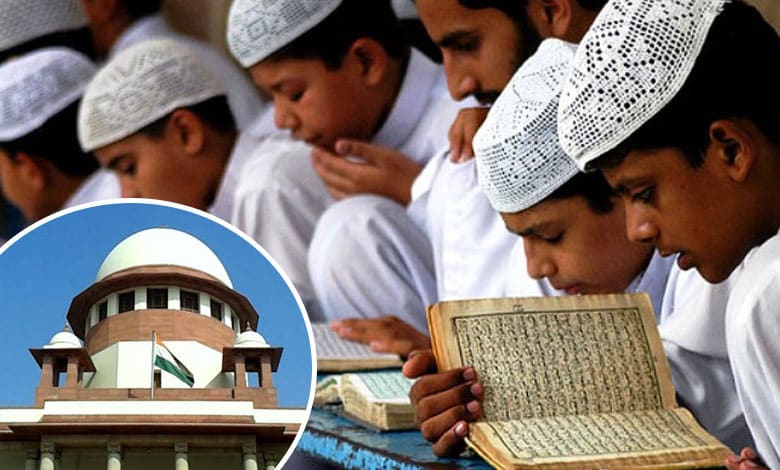Madrasa Students Face Uncertain Future as Supreme Court Declares Kamil and Fazil Degrees Unconstitutional

Lucknow: In a significant development, the Supreme Court of India has declared higher education degrees awarded by the Uttar Pradesh Madrasa Education Board unconstitutional, creating uncertainty for approximately 25,000 students currently enrolled in the Kamil and Fazil courses. These degrees, which were equivalent to undergraduate and postgraduate qualifications, were found to be in conflict with the University Grants Commission (UGC) Act, rendering them invalid.
The Supreme Court’s ruling, issued on November 5, has left students in limbo, as the Madrasa Board is no longer authorized to conduct exams for these courses. The state government has assured that it will explore legal avenues to address the situation and find a way forward for these students.
Supreme Court’s Ruling: Kamil and Fazil Degrees Declared Unconstitutional
The Supreme Court’s decision to annul the Kamil (undergraduate equivalent) and Fazil (postgraduate equivalent) degrees awarded by the Uttar Pradesh Madrasa Board has raised concerns about the future of thousands of madrasa students. The court’s ruling comes after a detailed review of the UGC Act, which governs the standards for higher education in India. According to the court, the Uttar Pradesh Madrasa Education Board’s provisions for offering these degrees violate the UGC Act, which restricts state legislation from regulating higher education outside its purview.
State Government to Explore Solutions for Affected Students
In response to the court’s verdict, Om Prakash Rajbhar, the Minority Welfare Minister of Uttar Pradesh, emphasized that the state government would find a solution to safeguard the future of madrasa students. Rajbhar assured that the government would thoroughly analyze the legal implications of the ruling and discuss possible options, including the possibility of affiliating madrasa students with other recognized universities.
“We will definitely find a way to resolve this issue, but we will need to study the order carefully and consider all aspects before making a decision,” said Rajbhar.
Uncertainty for 25,000 Madrasa Students
Currently, around 25,000 students are pursuing their studies in the Kamil and Fazil courses offered by the Uttar Pradesh Madrasa Education Board. Zaman Khan, General Secretary of the Teachers Association Madaris Arabia Uttar Pradesh, expressed concern about the immediate impact of the Supreme Court’s ruling on these students, who may now be unable to complete their education as planned.
“The Supreme Court’s decision is final, but the government must urgently find a solution to ensure that the future of these students is not jeopardized,” Khan said.
Madrasa Board’s Proposal for University Affiliation
In light of the ruling, the Uttar Pradesh Madrasa Education Board had earlier proposed to affiliate the students of the Kamil and Fazil courses with the Khwaja Moinuddin Chishti Urdu-Arabic-Persian University in Lucknow, a state university offering courses in related fields. However, no decision has been made on this proposal so far.
Qamar Ali, a former member of the Madrasa Board, pointed out that while these degrees were never recognized for competitive exams or broader employment outside of madrasas, the Supreme Court’s ruling effectively eliminates any job prospects for degree-holders, leaving them with limited options.
Ali has urged the government to urgently intervene and provide these students with the opportunity to enroll in recognized universities, allowing them to complete their higher education and pursue employment opportunities in the broader workforce.
The Road Ahead for Madrasa Education in Uttar Pradesh
Uttar Pradesh has a large madrasa network, with approximately 25,000 madrassas across the state, of which 16,500 are recognized by the State Madrasa Board. The issue of recognition and accreditation of madrasa degrees has been a longstanding concern. While 560 madrasas in the state receive grants from the government, many others remain unrecognized, affecting the students’ access to higher education and employment opportunities.
The Uttar Pradesh Madrasa Education Board Act, which was upheld by the Supreme Court in October 2024, provides a legal framework for madrasa education in the state. However, the recent ruling on Kamil and Fazil degrees highlights the ongoing tension between religious education boards and national education standards set by the UGC.
Looking Forward: What’s Next for Madrasa Students?
As the state government seeks a way forward, the future of madrasa students hangs in the balance. The priority will likely be to integrate these students into the formal higher education system, possibly by affiliating them with recognized universities. However, any such solution will need to address the legal complexities of the Supreme Court’s ruling.
For now, the uncertainty surrounding the Kamil and Fazil degrees leaves thousands of students and educators looking for clarity. The coming weeks will likely see discussions around how to accommodate these students within the broader educational framework, ensuring that their educational pursuits are not in vain.
